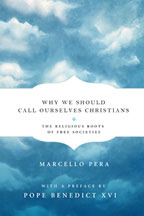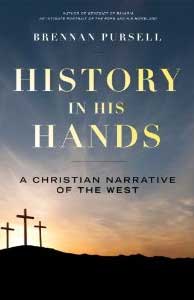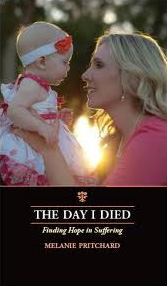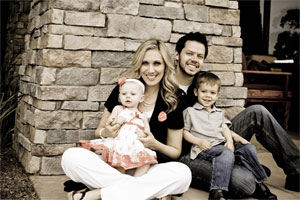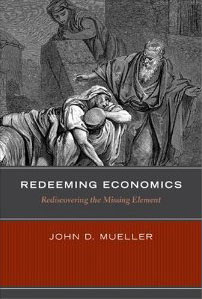 Katie Davis is “just a normal girl who is trying to do what God has asked her to do”.  “Kisses from Katie: A story of relentless love and redemption” is written by 22 year old Katie, who went to mission for a “short” time in Uganda and found God had another plan.  Now she is the adopted mother of 13 girls and founder of  Amazima Ministries, which encourages orphaned and vulnerable children and the poor in the country of Uganda. In the Lugandan language, Amazima (uh-mahz-i-muh) means “truth.” Amazima desires to reveal the truth of God’s unconditional love through Jesus Christ to the Ugandan people.  Katie is remarkable and inspiring and a joy to read and talk with.  Please, say a prayer for her and her “kids” today.
Katie Davis is “just a normal girl who is trying to do what God has asked her to do”.  “Kisses from Katie: A story of relentless love and redemption” is written by 22 year old Katie, who went to mission for a “short” time in Uganda and found God had another plan.  Now she is the adopted mother of 13 girls and founder of  Amazima Ministries, which encourages orphaned and vulnerable children and the poor in the country of Uganda. In the Lugandan language, Amazima (uh-mahz-i-muh) means “truth.” Amazima desires to reveal the truth of God’s unconditional love through Jesus Christ to the Ugandan people.  Katie is remarkable and inspiring and a joy to read and talk with.  Please, say a prayer for her and her “kids” today.
[powerpress]
You can find the book here
Katie’s blog is here
Tags: catholic, catholic podcast, catholic prayer, cathollc spirituality, Katie Davis, love, truth, Uganda
This entry was posted on Friday, December 9th, 2011 at 8:57 am
You can follow any responses to this entry through the RSS 2.0 feed.
The subtitle of this show is “insights from today’s most compelling authors”…I don’t think there’s a more compelling author than Elizabeth M. Bonker, who along with the help of her mother, Virginia Breen, has authored  “I Am in Here: The Journey of a Child with Autism Who Cannot Speak but Finds Her Voice”.  A powerful and poignant book, the conversation with Virginia is hope-filled as she shares with us all the challenges and love she has found in being the mother of Elizabeth and the strength they have both found in their relationship with God.
author than Elizabeth M. Bonker, who along with the help of her mother, Virginia Breen, has authored  “I Am in Here: The Journey of a Child with Autism Who Cannot Speak but Finds Her Voice”.  A powerful and poignant book, the conversation with Virginia is hope-filled as she shares with us all the challenges and love she has found in being the mother of Elizabeth and the strength they have both found in their relationship with God.
[powerpress]
“Elizabeth’s beautiful poetry clearly shows that some individuals with autism who appear to be low-functioning have real abilities. Elizabeth’s first words when she was able to type were ‘Agony. I need to talk.'”–Temple Grandin, New York Times bestselling author
Me
I sometimes fear
That people cannot understand
That I hear.
And I know
That they don’t believe I go
To every extreme
To try to express
My need to talk.
If only they could walk
In my shoes
They would share my news:
I am in here.
And trying to speak every day
In some kind of way.
Though she cannot speak, Elizabeth Bonker writes poetry that shines a light on the hidden inner world of autism and the world around us. I Am in Here is the spiritual journey of a mother and daughter who refuse to give up hope, who celebrate their victories, and who keep moving forward despite the obstacles. Elizabeth’s poetry and her mother’s stirring storytelling combine in this inspirational book to proclaim that there is always a reason to take the next step–with hope.
Be sure to check out their website at : Â Iaminherebook.com
Tags: catholic, catholic podcast, catholic prayer, cathollc spirituality
This entry was posted on Monday, December 5th, 2011 at 6:13 am
You can follow any responses to this entry through the RSS 2.0 feed.
It was an honor to have a conversation with Marcello Pera,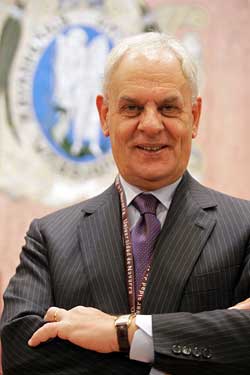 who  served as president of the Italian Senate from 2001 to 2006 and who now teaches political philosophy at the Pontifical Lateran University in Rome.  We discussed his book “Why We Should Call Ourselves Christians: The Religious Roots of Free Societies.  He maintains “that the very ideas on which liberal societies are based and by which they can be justified—the dignity of the human person, the moral priority of the individual, the view that man is a “crooked timber†inclined to prevarication, the limited confidence in the power of the state to render him virtuous—are distinctively Christian or, more precisely, Judeo-Christian ideas. Take them away and the open society will collapse.”  A  fascinating insight from a European viewpoint why America has succeeded in the past and the danger it faces in the future.
who  served as president of the Italian Senate from 2001 to 2006 and who now teaches political philosophy at the Pontifical Lateran University in Rome.  We discussed his book “Why We Should Call Ourselves Christians: The Religious Roots of Free Societies.  He maintains “that the very ideas on which liberal societies are based and by which they can be justified—the dignity of the human person, the moral priority of the individual, the view that man is a “crooked timber†inclined to prevarication, the limited confidence in the power of the state to render him virtuous—are distinctively Christian or, more precisely, Judeo-Christian ideas. Take them away and the open society will collapse.”  A  fascinating insight from a European viewpoint why America has succeeded in the past and the danger it faces in the future.
[powerpress]
 “The challenges of our particular historical momentâ€, as Pope Benedict XVI calls them in the Preface to the book, can be faced only if we stress the historical and conceptual link between Christianity and free society.
Tags: catholic, catholic podcast, catholic prayer, cathollc spirituality
This entry was posted on Tuesday, November 29th, 2011 at 6:15 am
You can follow any responses to this entry through the RSS 2.0 feed.
Episode 7 – Regnum Novum: Bringing forth the New Evangelization through Catholic Social Teaching with Omar Guiterrez – Value 5 The Common Good, Universal Destination of Goods, Subsidiarity, Participation, Solidarity part 1
– Value 5 The Common Good, Universal Destination of Goods, Subsidiarity, Participation, Solidarity part 1
[powerpress]
These are the five principles laid out in the Compendium of the Social Doctrine of the Church. If we understand these principles, then the work of the Revolution can begin. We are made now for a New Kingdom with Christ as our King in all things. Let us discover this place together, and make the devil cringe and know the suffering of defeat. “Love”
Discerning Hearts is blessed to present Omar F. A. Guiterrez, M.A. , Special Assistant to Archbishop George Lucas of the Archdiocese of Omaha, in a groundbreaking series which breaks open the heart of Catholic Social Doctrine.
We encourage you to visit “Regnum Novum – A New Kingdom: A Revolution” Omar Guiterrez’s blog site
 We live at a very special time. The confluence of many things has brought forth the clear need to be able to articulate the Social Teaching of the Catholic Church in a way that is accessible and applicable. This is not to be an effort where high-minded theories are to be bandied about. Rather, this is a time of opportunity wherein we can apply the Social Doctrine to the concrete so as to bring about a New Kingdom, a Revolution. – Omar G. from Regnum Novum
We live at a very special time. The confluence of many things has brought forth the clear need to be able to articulate the Social Teaching of the Catholic Church in a way that is accessible and applicable. This is not to be an effort where high-minded theories are to be bandied about. Rather, this is a time of opportunity wherein we can apply the Social Doctrine to the concrete so as to bring about a New Kingdom, a Revolution. – Omar G. from Regnum Novum
From episode 7… Point 5: The Common Good, Universal Destination of Goods, Subsidiarity, Participation, Solidarity
These are the five principles laid out in the Compendium of the Social Doctrine of the Church. If we understand these principles, then the work of the Revolution can begin. We are made now for a New Kingdom with Christ as our King in all things. Let us discover this place together, and make the devil cringe and know the suffering of defeat.
In this episode we focus on “The Common Good”.
Also visit Omar’s “Discerning Hearts” page Catholic Social Teaching 101
Tags: catholic, catholic podcast, catholic prayer, cathollc spirituality, The common good
This entry was posted on Monday, November 28th, 2011 at 7:59 am
You can follow any responses to this entry through the RSS 2.0 feed.
“History in His Hands -A Christian Narrative” …What a phenomonal book! 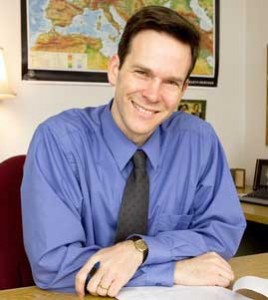  Not since “The Fulfillment of All Desires” have I been this excited about a work.  Brennan Pursell has brought the head to the heart and he’s done it with human history…outstanding!  More than even a history of mankind,  it is a history of  LOVE;  God is LOVE and our response to Him throughout time is what shapes our past, our present, and provides us a tentative direction for our future…where will our choices lead us? Dr. Brennan Pursell is one of my new heroes.  Do not let this one pass you by!
 Not since “The Fulfillment of All Desires” have I been this excited about a work.  Brennan Pursell has brought the head to the heart and he’s done it with human history…outstanding!  More than even a history of mankind,  it is a history of  LOVE;  God is LOVE and our response to Him throughout time is what shapes our past, our present, and provides us a tentative direction for our future…where will our choices lead us? Dr. Brennan Pursell is one of my new heroes.  Do not let this one pass you by!
  “A refreshing tour through familiar territory from an unfamiliar perspective. Dr. Pursell allows a convert’s vibrancy of faith to inform his historical analysis without oversimplifying it.â€Â —Fr. John Bartunek, author, The Better Part
Check out the book here
Tags: catholic, catholic podcast, catholic prayer, cathollc spirituality
This entry was posted on Monday, November 7th, 2011 at 5:51 pm
You can follow any responses to this entry through the RSS 2.0 feed.
“Dispose the day…” OK, I really didn’t understand the significance of St. Crispin and St. Crispinian except for their presence in the robust guy “band of brothers” speech from Shakespeare’s Henry V…very macho “rouse the troops” moment in the play… I just figured they were warriors too…(besides I’m more of a  “Midsummer Night’s Dream” kind of Shakespeare girl anyway…)
                         Â
 That is until I read Omar F. A. Gutierrez’s fantastic blog post bringing it all together! Treat your brain and heart by visiting his blog  Regnum Novum
That is until I read Omar F. A. Gutierrez’s fantastic blog post bringing it all together! Treat your brain and heart by visiting his blog  Regnum Novum
Here, once again, is Omar Guiterrez breaking open for Discerning Hearts the beauty of Catholic Social Doctrine….
(it’s amazing where you can find it if you have eyes to see and ears to hear)
Today marks the feast of Saints Crispin and Crispian, brothers who were martyred by beheading in Rome sometime during the reign of the Emperor Diocletian (emperor from 284-305 AD).
That the saints lived is certainly true. The story of these brothers, however, comes to us from a late account that has little to suggest it’s authenticity. Generally, though, we know them to be from Rome, to have worked in Soissons, Gaul (now France), and to have been shoemakers thus earning them the title of patrons for shoemakers, cobblers, and those who work with leather.
The tale is that these two brothers, perhaps twins of noble blood, caught up in the zealous care for their faith and in love for Christ, left Rome in the 3rd century in order to spread the Gospel in Gaul. They took up the trade of the shoemaker and would not charge the poor who requested their services. By their example, and not, it seems,by any grand preaching, these two were good witnesses to the faith and converted many. When Maximian was appointed co-emperor in 285 and came to Gaul, the brothers were accused and brought before a character named Rictiovarus, whom we don’t exactly know existed but whose seathing hatred for Christians is legendary. At any rate, they were tortured mercilessly, but when the attempt to kill the saintly brothers through drowning and burning failed, Rictiovarus was driven into such a desperate fury that he threw himself into the fire prepared for the brothers thus killing himself. Eventually, Crispin and Crispian were beheaded which is a very effective way of killing someone…unless you’re St. Winifred, in which case that might not always work.  There are several things I’d like to draw out about these saints.
The first is that it was on this day 595 years ago (1415) that King Henry V led his horribly outnumbered English army into battle against the French at Agincourt, the battle so wonderfully remember today for the speech written by Shakespeare in Henry V,( a version of which can be seen above with Kenneth Branagh.)
The second thing is this, brought out in an edition of Butler’s Lives of the Saints, namely that Sts. Crispin and Crispian are a wonderful reminder that sanctity is not only for the cloistered hermit who has removed himself from society. These two never embarked on some large speaking tour throughout Gaul. They did not write any large tomes explicating the faith for the masses. They are not known for levitating or bilocation or magically producing shoes no one today can replicate with all our modern technology. No, they were simply saintly shoemakers. They were holy artisans is all, and this is a good thing. In this way they are almost the perfect patron saints for laborers, heroes of the Social Doctrine of the Church.
I’m reminded of a line from the Part I Chapter 3 of St. Francis de Sales’ classic Introduction to the Devout Life where he says:
 It is an error, nay more, a very heresy, to seek to banish the devout life from the soldier’s guardroom, the mechanic’s workshop, the prince’s court, or the domestic hearth. Of course a purely contemplative devotion, such as is specially proper to the religious and monastic life, cannot be practised in these outer vocations, but there are various other kinds of devotion well-suited to lead those whose calling is secular, along the paths of perfection. The Old Testament furnishes us examples in Abraham, Isaac and Jacob, David, Job, Tobias, Sarah, Rebecca and Judith; and in the New Testament we read of St. Joseph, Lydia and Crispus, who led a perfectly devout life in their trades:–we have S. Anne, Martha, S. Monica, Aquila and Priscilla, as examples of household devotion, Cornelius, S. Sebastian, and S. Maurice among soldiers;–Constantine, S. Helena, S. Louis, the Blessed Amadaeus, 2 and S. Edward on the throne. And we even find instances of some who fell away in solitude,– usually so helpful to perfection,–some who had led a higher life in the world, which seems so antagonistic to it. S. Gregory dwells on how Lot, who had kept himself pure in the city, fell in his mountain solitude. Be sure that wheresoever our lot is cast we may and must aim at the perfect life.
Sanctity can be found through the work which God has given us no matter what that might be. Indeed it is to be found in the guardroom, in the shop, in the court, in the home. This is the message of the Social Teaching of the Catholic Church. Sanctity and evangelization can be found through the labor of everyday life. It is less what you do than the way you do it, and the way to do anything is with the love of Christ.
Third, I want to point out that with saints whose stories are in doubt it can be tempting to write them off as the incipient pap of bygone days. There are some who actually claim that the Church has managed its control over the laity throughout the centuries by inventing such stories. I’m not making that claim, but many are tempted to think that there never was such a saint, or that we cannot glean any lesson from them, or that, poor bumpkins that they were, those ignoramuses of the early years of the Church meant well if they weren’t always truthful. This sort of temptation is what Chesterton called “chronological snobbery.†Somehow we image that in our Enlightened age we appreciate truth much more than the people of the early centuries. This would be a terrible mistake.
Stories do evolve over time, and tales can be embellished but we should never forget three things: first, that the stories were told because of some real event or real person, even if we don’t remember their name and even if our collective memories have gotten the details wrong. Second, the miraculous is not impossible. We believe in things seen and unseen, so why presume the fantastical must be unreal? Third, someone in heaven answers to the name of these saints in question. That’s what matters.  – Regnum Novum
Thanks Omar! My visits to DSW will never be the same again.
Tags: catholic, catholic podcast, catholic prayer, catholic social doctrine, cathollc spirituality, christians, emperor diocletian, guiterrez, henry v, st crispin
This entry was posted on Tuesday, October 25th, 2011 at 10:16 am
You can follow any responses to this entry through the RSS 2.0 feed.
Episode 11- Regnum Novum: Bringing forth the New Evangelization through Catholic Social Teaching with Omar Guiterrez – Value 5 The Common Good, Universal Destination of Goods, Subsidiarity, Participation, Solidarity part 5
Social Teaching with Omar Guiterrez – Value 5 The Common Good, Universal Destination of Goods, Subsidiarity, Participation, Solidarity part 5
[powerpress]
These are the five principles laid out in the Compendium of the Social Doctrine of the Church. If we understand these principles, then the work of the Revolution can begin. We are made now for a New Kingdom with Christ as our King in all things. Let us discover this place together, and make the devil cringe and know the suffering of defeat. “Love”
Discerning Hearts is blessed to present Omar F. A. Guiterrez, M.A. , Special Assistant to Archbishop George Lucas of the Archdiocese of Omaha, in a groundbreaking series which breaks open the heart of Catholic Social Doctrine.
We encourage you to visit “Regnum Novum – A New Kingdom: A Revolution” Omar Guiterrez’s blog site
 We live at a very special time. The confluence of many things has brought forth the clear need to be able to articulate the Social Teaching of the Catholic Church in a way that is accessible and applicable. This is not to be an effort where high-minded theories are to be bandied about. Rather, this is a time of opportunity wherein we can apply the Social Doctrine to the concrete so as to bring about a New Kingdom, a Revolution. – Omar G. from Regnum Novum
We live at a very special time. The confluence of many things has brought forth the clear need to be able to articulate the Social Teaching of the Catholic Church in a way that is accessible and applicable. This is not to be an effort where high-minded theories are to be bandied about. Rather, this is a time of opportunity wherein we can apply the Social Doctrine to the concrete so as to bring about a New Kingdom, a Revolution. – Omar G. from Regnum Novum
From episode 11… Point 5: The Common Good, Universal Destination of Goods, Subsidiarity, Participation, Solidarity
These are the five principles laid out in the Compendium of the Social Doctrine of the Church. If we understand these principles, then the work of the Revolution can begin. We are made now for a New Kingdom with Christ as our King in all things. Let us discover this place together, and make the devil cringe and know the suffering of defeat.
In this episode we focus on “Solidarity”.
Also visit Omar’s “Discerning Hearts” page Catholic Social Teaching 101
Tags: catholic, catholic podcast, catholic prayer, catholic social doctrine, catholic social teaching, cathollc spirituality, Omar Guiterrez, solidarity
This entry was posted on Monday, October 10th, 2011 at 8:41 am
You can follow any responses to this entry through the RSS 2.0 feed.
“Life and Loss in the Shadow of the Holocaust:  A Jewish Family’s Untold Story” is an eloquent telling of a family scattered over three continents by Nazi persecution.  A heroic effort is undertaken by the authors, Rebecca Boehling and Uta Larkey on behalf the children of the generation subjected to the trauma presented in the book, to piece together the collective memory left by the Kaufmann-Steinberg family.  Intriguing, as well as disturbing, this is a book that will stay with you for a long time.  I came away from the read reminded once again never to take even the most ordinary moments in life for granted.[powerpress]
is an eloquent telling of a family scattered over three continents by Nazi persecution.  A heroic effort is undertaken by the authors, Rebecca Boehling and Uta Larkey on behalf the children of the generation subjected to the trauma presented in the book, to piece together the collective memory left by the Kaufmann-Steinberg family.  Intriguing, as well as disturbing, this is a book that will stay with you for a long time.  I came away from the read reminded once again never to take even the most ordinary moments in life for granted.[powerpress]
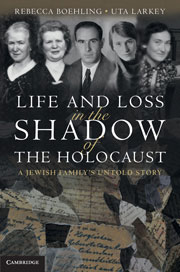 Â Â You can find the book here
  You can find the book here
Tags: catholic, catholic podcast, catholic prayer, cathollc spirituality
This entry was posted on Monday, October 3rd, 2011 at 8:49 am
You can follow any responses to this entry through the RSS 2.0 feed.
Cardinal Arinze  spoke with 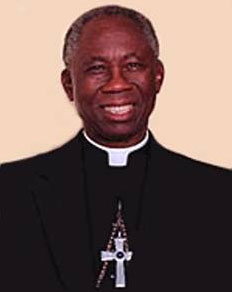 couples struggling with the challenge of infertility in Omaha on September 20, 2011.
couples struggling with the challenge of infertility in Omaha on September 20, 2011.
[powerpress]We apologize for some of the noise in the recording. Â The microphone was inadvertently attached to a file on the podium and was jostled during the talk…it’s not that bad and the talk is fantastic!
Francis Cardinal Arinze discussed the value of the marriage relationship and it’s contribution to the personal growth of the couple, it’s activity in the community and in the life of the Church.  Cardinal  Arinze goes on to talk about motherhood and fatherhood even when a couple do not have natural children of their own.  The joy of giving, as opposed to grabbing…the gift of joy.  He speaks of the example of priesthood and of St. Teresa of Calcutta (” The Smile of God”).  “Sacrificing yourself for others the sun begins to shine”.
Event sponsored by the Pro Sanctity Movement
Tags: Cardinal Arinze, catholic, catholic podcast, catholic prayer, catholic social teaching, cathollc spirituality, children, family life, Francis Cardinal Arinze, infertility, ivf, marriage
This entry was posted on Wednesday, September 21st, 2011 at 10:34 am
You can follow any responses to this entry through the RSS 2.0 feed.
Kate Wicker is OUTSTANDING and her book “Weightless: Making Peace with Your Body”  does so much more than it’s title offers…it reminds us how our faith can help us bring peace into our hearts!!!! I love it!  The blessing of our femininity,  a joy in the gift of the daughter of God we have been created to be, the peace that comes with a prayerful relationship with the Father…these are just  some of the fruits that come from Kate Wicker’s work in “Weightless”.  More than “self-help”, it’s really about letting the saints help, letting your faith help… ultimately, letting God help.  Insights, quotes, guidance, reflections, this book is perfect for individual or group study …check it out!
does so much more than it’s title offers…it reminds us how our faith can help us bring peace into our hearts!!!! I love it!  The blessing of our femininity,  a joy in the gift of the daughter of God we have been created to be, the peace that comes with a prayerful relationship with the Father…these are just  some of the fruits that come from Kate Wicker’s work in “Weightless”.  More than “self-help”, it’s really about letting the saints help, letting your faith help… ultimately, letting God help.  Insights, quotes, guidance, reflections, this book is perfect for individual or group study …check it out!
[powerpress]
What a fun and encouraging interview…it was one of those I just didn’t want to end. Â Take time to listen, then get a copy of the book for yourself and pass other copies to the women in your life.
There’s a wave of body dissatisfaction sweeping across society. While bookstore shelves are well-stocked with tomes on how to overcome body image problems, very few take a faith-based, much less Catholic, approach to self-healing. Weightless: Making Peace With Your Body speaks not only to those who may have faced an eating disorder, but also to anyone who wants to live an abundant life, unencumbered by our culture’s obsession with thinness, physical beauty, youth, or food.
Be sure to visit Kate’s website at katewicker.com
Get a copy of the book here (and get a copy for a friend…they’ll thank you for it!)
Tags: catholic, catholic podcast, catholic prayer, cathollc spirituality
This entry was posted on Monday, September 12th, 2011 at 6:08 am
You can follow any responses to this entry through the RSS 2.0 feed.
Non-Negotiable Political Issues for Catholics
[powerpress “faith-check-with-greg-youell”]
What does religion have to do with politics? If we can say that the mission of the Church is the happiness and salvation of all, then the Church will sometimes have to be involved with politics, since the actions of governments can have an impact on people’s happiness and salvation.
By reflecting on the Natural Law and the Gospel, the Church has developed social principles that should guide our societies and governments, including everything from the right to private property and a just wage to how we treat the poor and immigrants.
Of course, Catholics need not be monolithic in how these principles are applied, and there is room for legitimate difference of opinion on many issues.
On the other hand, the Church also teaches that some issues are so fundamental as to be non-negotiable.
In the document Sacramentum Caritatis, Pope Benedict named three specific issues that are paramount to the common good: first, defending human life at all ages and stages; second, upholding traditional marriage between one man and one woman; and, thirdly, protecting the natural right of parents to educate and raise their children according to their beliefs.1
Life, marriage, family—these three form the very foundation of societies, and should be given due priority by Catholics when we go to the ballot box.
1 -Â Sacramentum Caritatis 83 (Post-Synodal Exhortation on the Eucharist)
Tags: catholic, catholic podcast, catholic prayer, cathollc spirituality, voting
This entry was posted on Sunday, September 11th, 2011 at 4:06 am
You can follow any responses to this entry through the RSS 2.0 feed.
 What a remarkable witness…Melanie Pritchard! Â “The Day I Died: Finding Hope in Suffering” is the story of a young mother’s incredible sudden death during childbirth and her miraculous recovery. Â I remember the days during which the events chronicled took place. Â Mark Hart had made known to us the harrowing situation Melanie and her child were suffering. Â Bruce and I, our radio listeners, and people around the globe (thanks to the internet) joined in a communion of prayer and the results were indeed awe-inspiring. Â What a joy to talk with Melanie almost a year later, and what a delight to be able to share with all of you this blessed book.
What a remarkable witness…Melanie Pritchard! Â “The Day I Died: Finding Hope in Suffering” is the story of a young mother’s incredible sudden death during childbirth and her miraculous recovery. Â I remember the days during which the events chronicled took place. Â Mark Hart had made known to us the harrowing situation Melanie and her child were suffering. Â Bruce and I, our radio listeners, and people around the globe (thanks to the internet) joined in a communion of prayer and the results were indeed awe-inspiring. Â What a joy to talk with Melanie almost a year later, and what a delight to be able to share with all of you this blessed book.
[powerpress]
Be sure to visit Melanie’s blog at http://www.melaniepritchard.org/
You can also find Melanie’s book here
Tags: catholic, catholic podcast, catholic prayer, cathollc spirituality, childbirth, death, recovery, witness
This entry was posted on Monday, August 29th, 2011 at 7:03 am
You can follow any responses to this entry through the RSS 2.0 feed.
No one writes quite like Anthony Esolen.   He never, ever, fails to provoke thought and reflection; he verifies what we know in our hearts to be true…we just didn’t know how to express it.  In “10 Ways to Destroy the Imagination of Your Child” he holds a magnifying glass up to our hearts and minds and says to us all “Do really you see what we are doing?” Anthony points how we are extinguishing the minds (and souls) of our children in ten easy steps.
He never, ever, fails to provoke thought and reflection; he verifies what we know in our hearts to be true…we just didn’t know how to express it.  In “10 Ways to Destroy the Imagination of Your Child” he holds a magnifying glass up to our hearts and minds and says to us all “Do really you see what we are doing?” Anthony points how we are extinguishing the minds (and souls) of our children in ten easy steps.
Play dates, soccer practice, day care, political correctness, drudgery without facts, television, video games, constant supervision, endless distractions: these and other insidious trends in child rearing and education are now the hallmarks of childhood. As author Anthony Esolen demonstrates in this elegantly written, often wickedly funny book, almost everything we are doing to children now constricts their imaginations, usually to serve the ulterior motives of the constrictors.
Ten Ways to Destroy the Imagination of Your Child confronts contemporary trends in parenting and schooling by reclaiming lost traditions. This practical, insightful book is essential reading for any parent who cares about the paltry thing that childhood has become, and who wants to give a child something beyond the dull drone of today’s culture.
Learn more about this book here
Tags: catholic, catholic podcast, catholic prayer, cathollc spirituality
This entry was posted on Monday, August 22nd, 2011 at 8:45 am
You can follow any responses to this entry through the RSS 2.0 feed.
Fr. Robert Barron’s “Catholicism: a journey to the heart of the faith” is wonderful.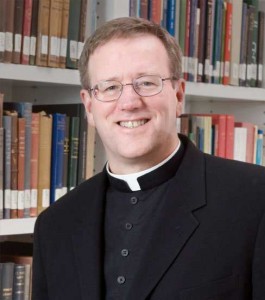 Â AÂ beautiful exploration of the Roman Catholic faith and it’s gift to the world and to culture.
 A beautiful exploration of the Roman Catholic faith and it’s gift to the world and to culture.
[powerpress]
From randomhouse.com
What is the Catholicism? A 2,000 living tradition? A worldview? A way of life? A relationship? A mystery? In Catholicism Father Robert Barron examines all these questions and more, seeking to capture the body, heart and mind of the Catholic faith.
Starting from the essential foundation of Jesus Christ’s incarnation, life, and teaching, Father Barron moves through the defining elements of Catholicism – from sacraments, worship, and prayer, to Mary, the Apostles, and Saints, to grace, salvation, heaven, and hell – using his distinct and dynamic grasp of art, literature, architecture, personal stories, Scripture, theology, philosophy, and history to present the Church to the world.
Paired with his documentary film series of the same title, Catholicism is an intimate journey, capturing “The Catholic Thing†in all its depth and beauty. Eclectic, unique, and inspiring, Father Barron brings the faith to life for a new generation, in a style that is both faithful to timeless truths, while simultaneously speaking in the language of contemporary life.
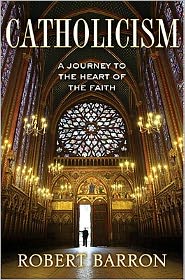 Â Find out more about the book Fr. Barron’s website : Â wordonfire.org
 Find out more about the book Fr. Barron’s website :  wordonfire.org
Tags: catholic, catholic apologetics, catholic apologist, catholic podcast, catholic prayer, cathollc spirituality, faith, fr. robert barron, heart, image books, random house, Robert Barron Catholicism, Roman Catholic, word on fire
This entry was posted on Monday, August 8th, 2011 at 7:52 am
You can follow any responses to this entry through the RSS 2.0 feed.
“Redeeming Economics: Rediscovering the Missing Element”, boy do we need this now! John Mueller, of the Ethics and Public Policy Center, does an extraordinary job of pointing out what we are missing in all the discussions about economics…the fundamental productive unit – the family.  He helps us to leap forward by looking backwards, by looking at the error in Adam Smith’s theory which has had no way to account for a fundamental aspect of human experience: the social relationships that define us, the loves (and hates) that motivate and distinguish us as persons.
Mueller, of the Ethics and Public Policy Center, does an extraordinary job of pointing out what we are missing in all the discussions about economics…the fundamental productive unit – the family.  He helps us to leap forward by looking backwards, by looking at the error in Adam Smith’s theory which has had no way to account for a fundamental aspect of human experience: the social relationships that define us, the loves (and hates) that motivate and distinguish us as persons.
In trying to reduce human behavior to mere exchanges, modern economists have lost sight of how these essential motivations are expressed: as gifts (or their opposite, crimes). Mueller makes economics whole again, masterfully reapplying economic thought as articulated by Aristotle, Augustine, and Aquinas.
Contrarian and compelling, Redeeming Economics covers everything from unemployment, to inflation, to the economics of parenthood, to the greatest geopolitical challenge facing the United States, to flaws in the mega-bestseller Freakonomics, to the author’s illuminating exchange with the controversial philosopher Peter Singer.
Learn more about the book here
Tags: Adam Smith, catholic, catholic podcast, catholic prayer, cathollc spirituality, economics, John Mueller
This entry was posted on Tuesday, July 26th, 2011 at 5:16 pm
You can follow any responses to this entry through the RSS 2.0 feed.



